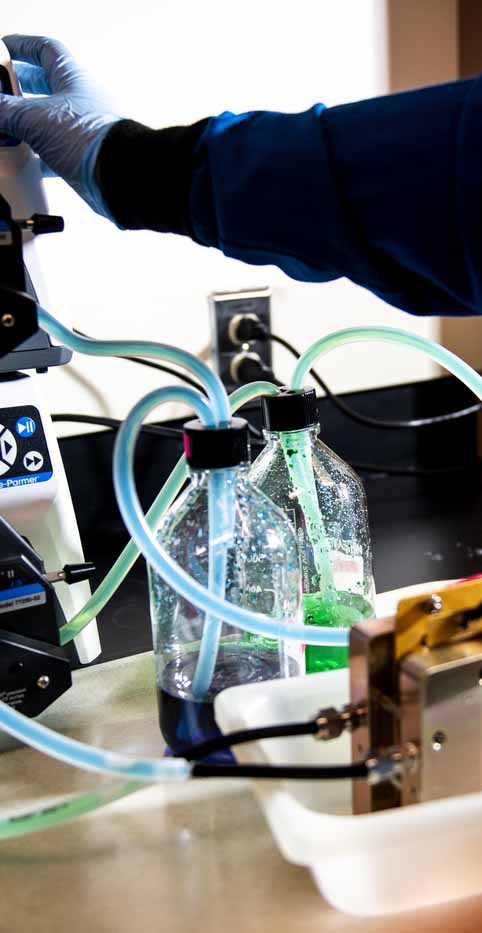
About
Growth. Learning. Exploration.
The Department of Chemical Engineering is a community of scholars comprised of faculty, graduate students, undergraduate students, cooperative associates, and staff. Our community shares a commitment to promote excellence in education and research through individual and collective responsibility for maintaining the highest expectations and standards.
The community of scholars is more than a collection of individuals. Our community provides a supportive yet challenging environment that both promotes the exchange of ideas, collaboration, learning, and individual growth and development, and rewards innovative and creative behaviors. This synergistic community engages all members in the active pursuit of academic excellence.
Quick Facts
In addition to the core traditional chemical engineering classes in Thermodynamics, Transport Phenomenon, and Reaction Kinetics, undergraduate students can also take minors in cutting-edge focus areas and also pursue combined majors such as chemical engineering and physics or chemical engineering and biochemistry.
Our graduate students are a diverse and highly qualified group from all over the world, including the United States, India, Turkey, some European nations and China, to name a few countries. The department’s research areas include Biomolecular and Biomedical Systems; Complex and Computational Systems; Energy and Sustainability; Engineering Education and Pedagogy; and Materials and Nanotechnology. Graduate students are able to select thesis topics from a diverse range of faculty research interests.
The current department reflects the changing face of chemical engineering today, as well as the changing landscape at Northeastern, which as a university has made a commitment to excellence in research. There are currently 24 tenured-tenure track faculty in the department as well as teaching faculty and affiliated faculty, supporting the department’s diverse research and curriculum to prepare tomorrow’s engineers for the challenges they face.
Today’s chemical engineering student is likely to see courses in tissue engineering, polymer science, or nanotechnology alongside the traditional chemical engineering courses. Together with co-op experiences and hands-on chemical engineering experiments in the unit operations courses, graduates of the program are exceptionally well prepared for any path they might choose thereafter, be it academic, industrial, or professional.
Our History
Chemical engineering at Northeastern began with one student in 1909 when tuition was $100 a year (including YMCA membership), rooms were $1.50 a week, and board was from $3.50 to $5.00 a week. Co-op assignments paid from $5.00 to $6.00 a week for thirty weeks. By 1917, there were two faculty: William F. Odom (also coach of the baseball team) and Samuel A. S. Strahan (the first Department Head).
The curriculum was defined such that chemical engineers “…must be able to consider propositions, processes, and plans from the combined viewpoints of the chemist and the engineer [and that their] training should of necessity be very broad, combining that of both of the above named professions…”
That description of chemical engineering as a discipline is even truer today than it was in the early 1900′s – chemical engineering has grown in scope tremendously over the past century, with chemical engineers now bringing their expertise and knowledge to a diversity of other fields, including the chemical and biological sciences, materials science, and nanoscale engineering.
A full-time doctoral program leading to the PhD degree was established in 1964 with four doctoral students. In 1967, the first PhD from the department was awarded to Ralph A. Buonopane who had been appointed an assistant professor in the department in 1966 and would eventually go on to become department chairperson, serving from 1986 to 2001.